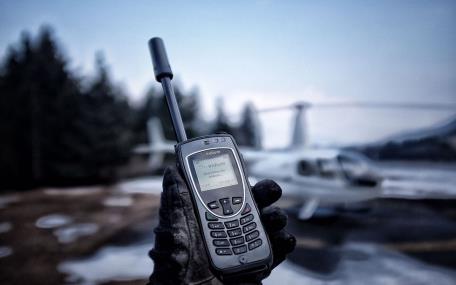
Guide to Satellite Phones: Why You Need One and How They Work
In today’s interconnected world, communication is critical. Yet, there are still areas where traditional mobile networks fail to reach. This is where a satellite phone becomes invaluable. A satellite phone, often called a sat phone, is a mobile device that connects directly to satellites orbiting the Earth, providing communication access in even the most remote locations. Whether you’re an adventurer, a disaster relief worker, or someone traveling to areas without cellular coverage, a satellite phone can be a lifesaver.
How Satellite Phones Work
Understanding how satellite phones work is essential to appreciate their value. Unlike regular cell phones that rely on terrestrial cell towers, satellite phones communicate directly with satellites in orbit. These satellites relay signals back to ground stations, which then connect to the regular phone networks or the internet. This direct line of communication means that a satellite phone can function virtually anywhere on the planet, provided it has a clear line of sight to the sky. This makes satellite phones particularly useful in regions where traditional communication infrastructure is nonexistent or has been compromised.
The Importance of Satellite Phones in Remote Areas
One of the primary uses of a satellite phone is in remote areas. Imagine being on a remote mountain expedition or in the middle of the ocean; regular mobile networks would be useless. A satellite phone ensures you remain connected, no matter how far you are from civilization. This ability to communicate from remote areas is crucial for personal safety, coordinating activities, accessing weather updates, and maintaining contact with the outside world. Having a satellite phone can mean the difference between life and death in emergencies.
Satellite Phones vs. Traditional Mobile Phones
While satellite and traditional mobile phones serve the same primary function—communication—their operational mechanisms are vastly different. A conventional mobile phone relies on a network of cell towers to transmit and receive signals. In contrast, a satellite phone connects directly to satellites orbiting the Earth. This fundamental difference means that satellite phones can operate in areas where mobile phones cannot. However, it’s important to note that satellite phones are bulkier, more expensive, and have higher per-minute call costs than traditional mobile phones. Despite these drawbacks, the advantages of having reliable communication in remote areas far outweigh the cons.
Key Features of Modern Satellite Phones
Modern satellite phones have various features designed to enhance communication and usability. These features include GPS capabilities, allowing users to track and share their location with others. Additionally, many satellite phones offer SMS messaging, email capabilities, and even internet access, albeit slower than traditional mobile networks. Some satellite phones are designed to be rugged and water-resistant, making them suitable for harsh environments. Battery life is another critical feature, with some models offering extended battery life to ensure communication is available when needed most.
Satellite Phones’ Use in Disaster Relief
In the aftermath of natural disasters, traditional communication networks are often among the first infrastructures to be compromised. Earthquakes, hurricanes, and other catastrophic events can destroy cell towers and disrupt communication channels. Satellite phones, however, remain operational, providing a vital lifeline for disaster relief efforts. Emergency responders and relief organizations rely on satellite phones to coordinate rescue operations, communicate with affected populations, and organize the delivery of essential supplies. The reliability of satellite phones in disaster situations cannot be overstated; they are often the only means of communication when all other systems have failed.
How to Select the Best Satellite Phone for Your Requirements
When selecting a satellite phone, you must consider your specific needs and the environments in which you’ll use the device. Factors such as battery life, durability, and network coverage should be top considerations. Some satellite phones are designed for general use, while others are tailored for specific environments, such as maritime or aviation. Additionally, the cost of the satellite phone and the associated service plans should be considered. Some service providers offer pay-as-you-go plans, while others require monthly subscriptions. Understanding the features and limitations of different satellite phone models will help you make an informed decision.
Cost Considerations: Is a Satellite Phone Worth the Investment?
The cost of owning and operating a satellite phone can be significant, which raises the question: is it worth the investment? The answer is a resounding yes for individuals and organizations that frequently operate in remote or disaster-prone areas. The peace of mind that comes with knowing you can communicate in any situation is invaluable. While the upfront cost of a satellite phone and the per-minute call rates may be higher than those of traditional mobile phones, the ability to maintain communication in critical situations justifies the expense. Additionally, satellite phone costs have gradually decreased, making them more accessible to a broader audience.
Legal and Regulatory Considerations
Before purchasing and using a satellite phone, knowing the legal and regulatory considerations is essential. In some countries, the use of satellite phones is restricted or even prohibited due to security concerns. For example, in India and China, the use of satellite phones is heavily regulated, and users must obtain special permits. It’s essential to research the regulations in the regions where you plan to use the satellite phone to avoid legal issues. Additionally, some satellite phone providers require users to register their devices and obtain necessary licenses, ensuring compliance with local laws.
The Future of Satellite Phones
As technology continues to evolve, the future of satellite phones looks promising. Advances in satellite technology are leading to smaller, more efficient devices with improved connectivity and features. Integrating satellite phones with other communication technologies, such as the Internet of Things (IoT), is also on the horizon, offering new possibilities for remote communication. Furthermore, the increasing demand for reliable communication in remote areas and during emergencies drives innovation in the satellite phone industry. As a result, we can expect satellite phones to become more affordable, user-friendly, and versatile in the coming years.
Conclusion
In conclusion, satellite phones are indispensable tools for communication in remote areas and during emergencies. They provide a reliable means of staying connected when traditional mobile networks are unavailable. Although satellite phones can be more expensive and bulkier than regular cell phones, their ability to function in areas without terrestrial networks makes them invaluable. Whether you’re an adventurer, a disaster relief worker, or someone who frequently travels to remote locations, investing in a satellite phone ensures you remain connected. As technology advances, satellite phones will likely become even more essential, offering enhanced features and broader accessibility.Discover everything you need to know about satellite phones—how they work, their benefits, and why they are essential for communication in remote areas.




